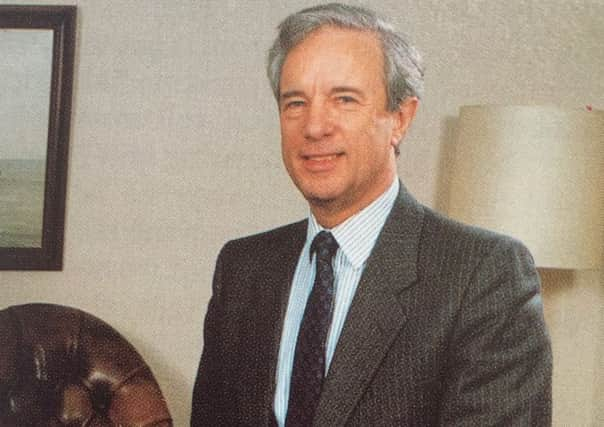Obituary: Charles Smith, globe-trotting accountant renowned in the oil industry


Charles Smith had been inspired to enter the accounting business by visits to a Scottish sugar refinery where his uncle was company secretary – although it was not so much the number-crunching that intrigued the youngster but the way the figures linked to the rest of the process.
Nevertheless the book-keeping side interested him sufficiently to secure a chartered accountancy apprenticeship with the former Edinburgh firm Carter, Greig and Co where clients ranged from private Highland estates to Fife coal mines.
Advertisement
Hide AdAdvertisement
Hide AdFast forward a few years and he had swapped the capital’s sedate St Andrews Square for the unpredictability of West Africa where, at one point embroiled in a country struggling for independence, the quietly-spoken Scot admitted he didn’t know whether to be “scared or excited”.
It was something of a quantum leap from the conventional life of an Edinburgh accountant for Smith who went on to become an internationally-renowned oilman, to preside over two influential industry bodies and become a CBE for his contribution to the oil business.
The son of Chief Inspector Harold Smith and his wife Laura, he was educated at Moray House School and Boroughmuir Senior School and, thanks to his uncle’s tour of a Greenock sugar refinery, began his working life in finance.
His career was interrupted by two years’ National Service working accounts at RAF Cosford in Shropshire and, after being demobbed, he spent three-and-a-half years as an internal auditor with Vauxhall Motors in Luton.
Resolving to broaden his sphere of work he then replied to an advert for a London accountant, placed by an unidentified oil company. He was interviewed by a fellow Scot, an Aberdonian, and secured the job which turned out to be with Gulf Oil. It was 1957, a few years before the first North Sea drilling licences were awarded, and his duties included keeping an eye on the commercial aspects of operations in Kuwait and Iran.
His first overseas job came in 1962 when he was asked to go to Nigeria to join the team running Gulf’s operations there. His only knowledge of Africa came from school geography classes and the odd missionary film. “I didn’t know anything about the country but it sounded interesting,” he said. So he left for Lagos with his wife Isobel and their three small children.
It turned out to be “quite an experience”. He was there for more than three years, a pioneering period that involved dealing with the first discovery well through to production in the first field. In those days, as he later recalled, the financial manager did everything except exploration and drilling. Returning to London at the end of 1965 he spent the following three years as the company’s financial adviser to its exploration and production group in the Eastern hemisphere before heading to Oklahoma to learn more about the industry at grass roots level.
From there he was sent to Angola where Portuguese and Angolan workers were being trained to take over from ex-pats. He learned Portuguese to help him negotiate agreements with the ruling Portuguese government in Lisbon and the Angolan authorities.
Advertisement
Hide AdAdvertisement
Hide AdIt was an “interesting” time, he recalled, as the country strove for independence. “I was a Scot running an American oilfield in a Marxist country, guarded by the Cubans from other rebel factions. It was weird. You didn’t know if you were scared or excited.”
The mid-1970s saw him back in London once more where his work involved dealing with the repercussions of steep oil price rises and the decision by members of the Organisation of Petroleum Exporting Countries (OPEC) to take control of their own domestic petroleum industries.
Meanwhile, Angola became independent but with a civil war still being waged there, Gulf had pulled out of the country. However in 1976, with Nigeria acting as intermediary, the company was invited to meet the new Angolan government. An agreement was struck and in May that year Smith returned to Angola, in charge of Cabinda Gulf.
After four years in Angola he had a brief spell in Houston, heading planning for international operations, before returning to Nigeria in 1981 as managing director of Gulf’s operations.
He was organising celebrations to mark 21 years since the company’s first oil discovery in the country when he heard about a takeover bid by Chevron. The following year, 1985, he returned to London to become managing director of Chevron UK.
Just three years later the global industry was horrified by the Piper Alpha disaster which claimed 167 lives after the platform was blown apart in a series of explosions. Soon after that Smith became president of the UK Offshore Operators Association and was heavily involved in Lord Cullen’s subsequent inquiry into the tragedy and in the implementation of his wide-ranging safety recommendations.
He was also president of the Petroleum Institute from 1992 to 1994, the year that he was made a CBE for services to the oil industry. After retiring from Chevron he chaired Dana Petroleum from 1995 to 2004.
Smith whose hobbies ranged from reading and history, to gardening, travel and tennis, finally retired fully the following year.
For the past four years he had lived in Guernsey and is survived by his wife Isobel, sons Colin and Graham, daughter Carolyn, six grandchildren and two great-grandchildren.
ALISON SHAW